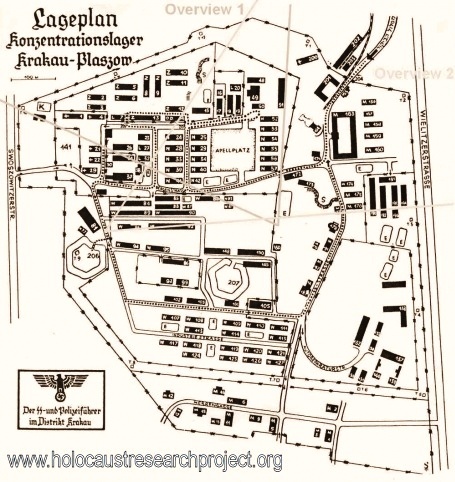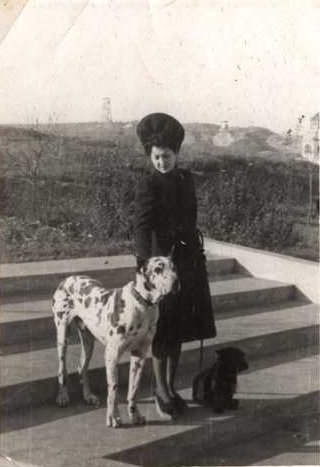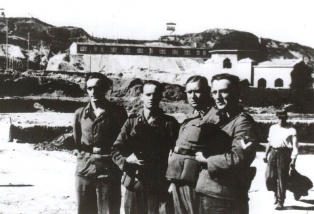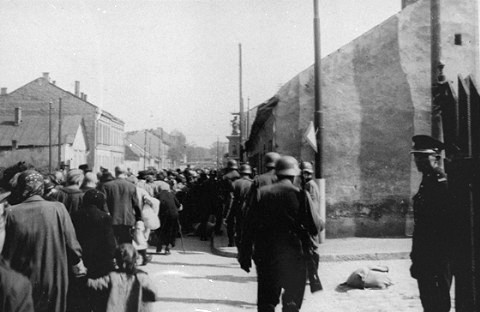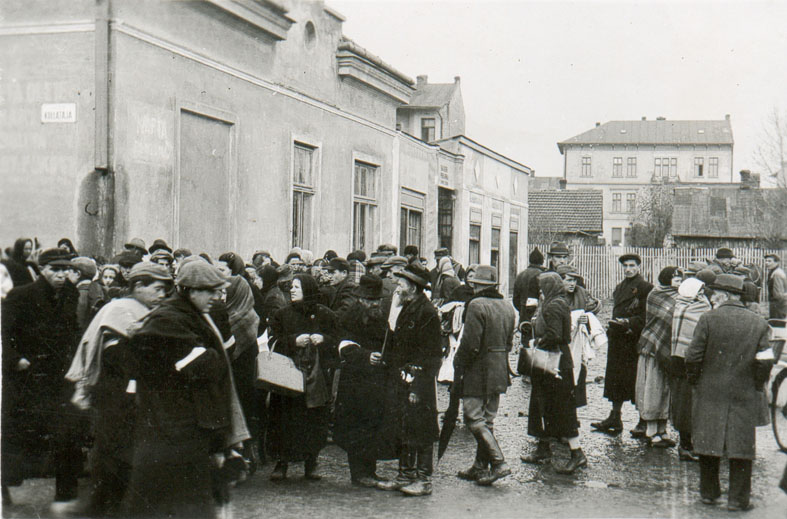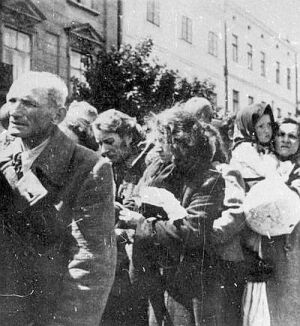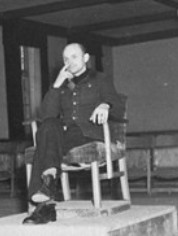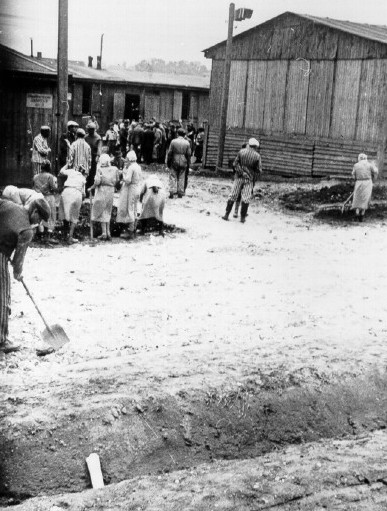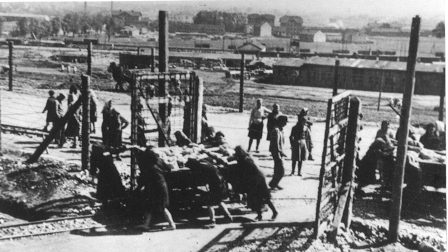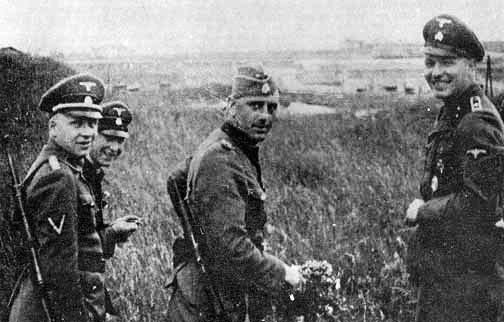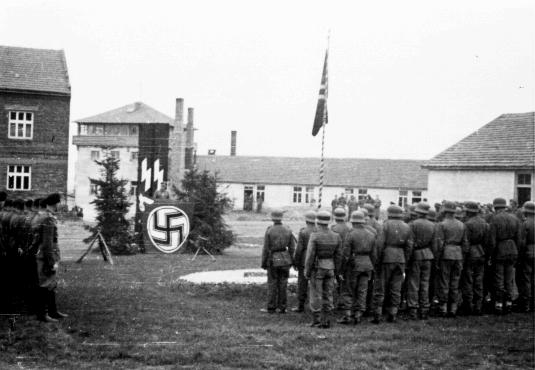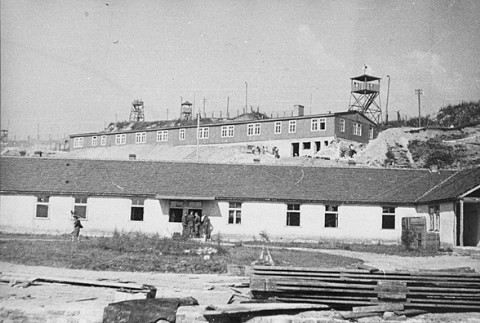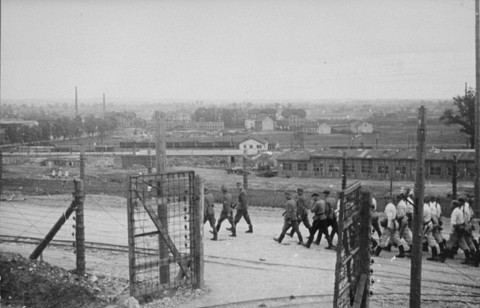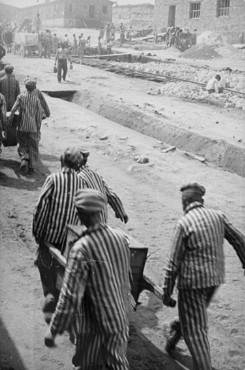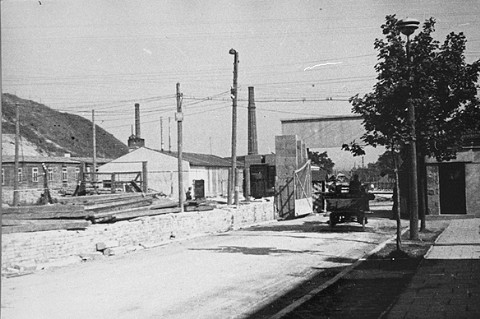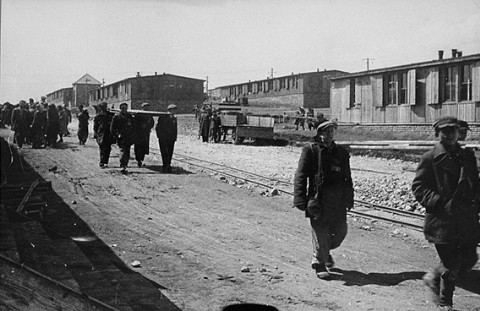Holocaust Education & Archive Research Team |
|
Trials Introduction to the Holocaust Trials
Trials
Interrogations & Testimonies
The IMT Series Nazi Justice
| ||||||||||
The Trial of Amon Goeth Part 2 Initial Cross Examination and Witness Mr Mieczyslaw Pemper
Chairman: The accused has stated that in Plaszow only 6-8 persons have been hung, and besides of this he has not heard anything about hanging. Could the accused name the incidents, which are known to him, about executions in Plaszow?
Accused: The surnames I do not know but there were two women who escaped. In that case they were arrested by police, before their escape was known in the camp. The police established that they had contacts with underground bands, and ordered execution.
Chairman: And other cases?
Accused: Two further cases of Krautwirth and Haubenstock
Chairman: For what reason?
Accused: For incitement of Ukrainian troops to revolt
Chairman: And other cases?
Accused: Some additional 2-3, I cannot remember, but that was all.
Judge Dobromeski: Whose dogs were there?
Accused: I owned my own dog kennels
Judge: For what reason was there a kennel maintained in the camp, and for what reason was there such a large number of dogs?
Accused: Only for reasons of breeding.
Judge: Were these dogs trained, and who was the trainer?
Accused: They were not trained. They could even go for walks with my household
Judge: Were the kennels fenced off from the remainder of the camp. Was there some security there?
Accused: The dogs were partly at home, and partly in a special enclosure, from where they could not escape.
Judge: What was the breed?
Accused: Dogi. Before the special enclosure was built, the dogs were on chains in their huts.
Judge: Were women taken to the camp with their children?
Accused: With their children, but this happened without our knowledge. The women were taking children into the camp, and they would be found there.
Judge: In such cases the children were kept together, or were they in some separate barrack for children?
Accused: At first the children were with their mothers, later a separate barrack for children was set up.
Judge: Why has the accused, stated a moment before, that there was no such children’s barrack?
Accused: It was arranged later, at the beginning it was not there
Judge: Did the children have access to the place where the dogs were being kept?
Accused: No they had no access there.
Judge: Was there any incident of a child being savaged by dogs?
Accused: Impossible, there was none. Only in my house were the dogs very menacing.
Judge Zembaty: Has the accused deprived someone of his life?
Accused: Yes.
Judge: What were such cases, how many and for what reason?
Accused: In that case, if they did not obey the established rules, if a prisoner was found in possession of explosives.
Judge: Did the accused kill with his own hands?
Accused: Yes, several people.
Judge: In how many cases have you ordered for someone to be deprived of his life?
Accused: Also in several cases, but this I do not remember, I cannot say.
Judge: For what reason?
Accused: For the same reasons as I have stated earlier.
Judge: Has any member of the camp guards without your knowledge killed any prisoner?
Accused: No, I do believe that was so. In any event I am not aware of such a case. If there were such cases, they were reported to the chief of the police.
Judge: Were the prisoners tortured in the camp, if so, by what means?
Accused: None were used.
Judge: Maybe without your knowledge, by the guards on their own?
Accused: Likewise no.
Prosecutor Siewierski: Who was authorised to sentence any one to death, in cases, were as you have stated, it was considered legal to do so, as for example in cases of possession of explosive materials?
Accused: I myself.
Prosecutor: Did you have any procedure, which was followed, in the process of sentencing someone to death?
Accused: No.
Prosecutor: Was this the case, when the camp was a labour camp, as well as when it was elevated to the status of a concentration camp? Were you therefore authorised to sentence prisoners to death?
Accused: Yes, I have been authorised, but before doing so I had to make a report, as happened in the case of Chilowicz.
Prosecutor: So first you had to have a decision, and only thereafter you carried this decision out?
Accused: Yes.
Prosecutor: The cases were, as you have testified, you were authorised to give the sentence of death, did they include the seven cases of hanging which you have reported?
Accused: These incidents happened not in 1943, but in 1944 when I have no longer been in the camp.
Prosecutor: Were you present during the liquidation of the Ghetto in Krakow, and after that in the Ghetto of Tarnow?
Accused: That is so.
Prosecutor: Were you aware that people were being killed there in the streets, not as a result of a sentence, nor as punishment for any reason at all?
Accused: I have seen that thousands of people were being shot
Prosecutor: Did you personally participate in this shooting?
Accused: No.
Prosecutor Cyprian: Were you authorised to sentence a prisoner to be flogged and did you personally administer this flogging?
Accused: Generally I do not remember, but from time to time, there were such cases, it could have happened. .
Prosecutor: Was this included in the duties of a camp commander, or maybe you have done this of your own free will?
Accused: Only in those cases, where I have been very incensed.
Prosecutor: During the liquidation of the Ghetto in Krakow were there many people killed?
Accused: Yes.
Prosecutor: Approximately how many?
Accused: About 2,000. One must include in this figure, all those killed by the police.
Prosecutor: How was it, that such large numbers of people were killed?
Accused: It happened in cases where people destined to be deported went into hiding.
Prosecutor: Were you responsible for the methods deployed in the process of the liquidation of the Ghetto in Krakow?
Accused: I have not been responsible for the liquidation, nor for any matters in the Ghetto, as everything to the Ghetto in Krakow, was the exclusive domain of Haase.
Prosecutor: What were you doing in the Ghetto during this liquidation?
Accused: Accompanied by my unit, my responsibility was limited to the transfer of people, from those blocks in the Ghetto which were due to be liquidated. The searches in the Ghetto were carried out by the SS.
Prosecutor: Did members of your unit participate in the killing of Jews, yes or no?
Accused: My unit was stationed in front of the Jewish Council building, as far as I know, no one was shot there.
Prosecutor: Did you personally liquidate the Ghetto in Tarnow?
Accused: Yes.
Prosecutor: Were there many people killed there?
Accused: As far as I know not many.
Prosecutor: Have you at any time killed, or ordered to kill a child?
Accused: No.
Having been called by the Chairman of the Tribunal, the witness Mr Pemper entered the hall. Prosecutor Siewierski requests that the witness take the oath. This witness as all the other witnesses following took this oath in the Court.
Witness Mr Mieczyslaw Pemper, age 26, university student was in Plaszow from March 1943 to the 15th October 1944, when I have been transported out. A few days after arriving in Plaszow, a friend of mine who worked in the camp office, pointed me out to Goeth, stating that I can write short hand in German. In March 1943 I started work in the camp office and my immediate superior was the accused Goeth.
Based on the correspondence, written by me, but dictated by the accused and based on secret correspondence, partly dictated by the accused, I had the opportunity of establishing every aspect of the activities of the accused. Partly also obtained from secret correspondence, not written by me, but which I have managed to gain access to by other means.
The accused was transferred to Krakow from Lublin on the 11 February 1943, his file had the date of nomination in Krakow as 13 February 1943. I am specifically referring to this date, as it was exactly one month before the liquidation of the Ghetto in Krakow.
In the course of one month from the 11th/13th February 1943, to the 13th March he succeeded to expand the capacity of the camp in Plaszow to such an extent that the liquidation of the Krakow Ghetto became possible, with the accommodation of a large number of able bodied people being accommodated in the camp in Plaszow.
The camp opened in October/ November 1942, accommodating in those few months 2,000 persons, which the accused managed to increase during his 30 day presence, several fold by various means.
The appearance of the accused in Krakow produced much consternation, also because up till then the entry into the camp from the Ghetto, or vice versa, was possible, without the loss of life. The transfer of inhabitants from the Ghetto into the camp went on in a comparatively slow pace, approximately 100 persons daily.
The inhabitants of the Ghetto formed an opinion of the camp on information of its present occupants, who were prisoners working on the railways. The life there was tragic and very harsh, but there was no danger of death.
From the day Goeth arrived there, the conditions were changing for the worse with every minute. The methods employed by Goeth were headed by his frequent sentencing to death, for any misdemeanour the penalty was death, and at that immediate, without a judgement, without a warning. For any offence considered by the accused as such, people were being shot whilst working.
Prior to the arrival of the accused in Plaszow, it was frequently possible to visit the Ghetto, as the camp did not have a hospital, and the Ghetto did have one. Goeth immediately following his appointment as camp commander, introduced heavy penalties for anyone leaving the camp, in connection with this between the 11th February and 13th March two young girls were hanged.
The work was also considerably accelerated by the frequent use of whipping and application of joint responsibility. This took the form that each work group had its quota of work assigned, which had to be completed within a specified time. All surrounding camps were incorporated within the camp in Plaszow, the working columns were considerably increased, all this made the complete liquidation of the Ghetto on the 13th March possible.
The action to liquidate the Krakow Ghetto commenced and took place on the 13th and 14th March 1943. On the 13th, escorted by a detachment of Ukrainian SS guards, several thousand inhabitants of the Ghetto were transferred to the camp in Plaszow, the following day on the 14th, the shooting of the people that remained in the ghetto began.
The people that were not taken out, were people who were considered by the SS as unfit for slave labour in the camp. The children, separated from their mothers by force, were also taken to the camp, taken into one of the houses in the camp and shot there.
Some people, refusing to be separated from their families or children, although entitled to leave, decided to stay in the Ghetto, and perished. I know that several hundred corpses were brought into the camp, on open wagons, from the ghetto and buried in a mass grave. This mass grave was just outside of the camp, but due to the progressive expansion of the camp, it soon lay within the perimeter of the camp itself.
Exactly two weeks following the liquidation, on the 27th of March 1943, in the evening, a search was instituted throughout the camp in Plaszow. In the process of this search, the prisoners had all monies confiscated, also taken were all items of any value, including clocks and watches.
The items confiscated were then stored in one of the barracks, and there sorted. Some of these watches and clocks, but only the primitive ones, were allocated to various prisoners, who in the performance of camp duties, required a time keeping device (Block supervisors and Office employees).
Slowly, this booty was being sent on to the central SS stores of Jewish property, and as Chilowicz told me, he removed a lot of items for the use of the accused. Goeth kept the most valuable items taken in this search for himself, and with the assistance of Chilowicz, these were being sold in Krakow for cash, which in turn was used by the accused for various personal requirements.
During the period when the camp was a forced labour camp, there were no rules, no laws, no senior authority; everything was decided by the camp commander. When the camp was transformed into a concentration camp, a whole series of changes took place.
First of all, an enormous amount of camp manuals arrived, covering every aspect of camp life. One manual for example dealt with the penalty of flogging of women. The directives in those manuals went so far as to how an order from the chief of the department dealing with concentration camps, directing all camp commanders when flogging women, how to organise this, the instruction continued to detail the arrangements in such a way, that Czech women are to be beaten by Slovak women, Polish women by Russian women, and vice versa. It would appear that this was done deliberately, in order to create animosity between the various nationalities.
The most important manual, I considered the one that stated, “that the only person who decides a prisoners life or death is only exclusively Hitler.” All SS men, serving in a concentration camp had to sign a declaration, confirming, that they are aware, that it is forbidden for them to kill a prisoner without permission. They did have however methods to circumvent this regulation.
There were two such methods. First of all, the commander could send a telegram to Berlin, requesting permission to kill various prisoners. This application had to include all personal data of each prisoner in question.
I have typed many applications of this nature, dictated by Goeth, dealing with prisoners suspected for attempted escape from a camp in Wieliczka. The prisoners were aware with the approaching front line, the camp will be closed, and they will be transferred to Flossenburg, possibly in July. According to the SS commander there, a group of prisoners, in order to evade this transfer to Flossenburg attempted to hide in the salt mines of Wielczka. They were caught and brought to Plaszow.
Following a conference with the local SS commander in Wielczka, Goeth decided to apply to Berlin, for these prisoners to be sentenced to death. This application has been confirmed by Berlin, and a short time following receipt of same in Plaszow, the hanging was carried out.
The second method used was applied in the so-called action of the 14th May 1944. Faced with the mass of new rules and manuals, Goeth felt very uncomfortable and behaved clumsily, as in any case, by nature he did not seem to like to observe regulations, with the result, that the first few months of the camp as a concentration camp, did seem to be a relief from the times and sufferings when it was just a forced labour camp.
It does not mean that the concentration camp was lenient; I just want everyone to understand how terrible the former forced labour camp regime was, so that the change to a “planned economy” in the camp, with superior supervision, was considered by the prisoners, as some sort of relief.
The first months as a concentration camp produced few items of news, other than small transports of prisoners were sent to various camps to work. I became aware and from the various manuals marked “Aktenplan” which was secret and specially coded could decipher, that in Germany there are hundreds of camps, attached to various factories, where prisoners do live and work, this gave a certain hope, that maybe we too will survive in such an environment.
The action of the 14th of May became proof, that the accused can use special means. Towards the end of April 1944, a confidential telegram from Berlin, arrived for the personal attention of Goeth. The telegram came from SS Standortsfuhrer Maurer, who was the deputy to Gruppenfuhrer Glucks, commanding chief of all concentration camps, who was also responsible for the supply and distribution of prisoners to all the various camps under his command.
This telegram from Standortfuhrer Maurer requested Goeth to advise if, and how many prisoners from Hungary, he is able to accept in transit, for a short period into Plaszow.
These transports contained prisoners already selected in Auschwitz and destined to work in various armaments factories. They had to be accommodated, until suitable camps were established in the vicinity of their destined industries.
The accused replied to this that due to the situation in the camp in Plaszow, he is unable to accept any new arrivals, at best a very limited number. He is however able to accept up to 10,000 prisoners of this Hungarian transport on condition that Amstgruppe D will permit the following:
1) Cleansing the camp of elements considered by the accused as non-productive, the aged, ill, weak, unsuitable for work, children and so on. 2) In addition would Amstgruppe D permit the doubling of use of the bunks in which the prisoners were sleeping.
Goeth intended to create a nightshift, so that each bunk would be occupied by two prisoners, one at night, one in daytime, thereby doubling the sleeping capacity of the camp
The first condition which Goeth raised meant the killing of these people, whom he considered as an unproductive element. The second condition was proof and indicative of total lack of feeling of responsibility towards the prisoners of the camp. The camp in Plaszow was not well supplied with water, there were constant problems with this.
The introduction of thousands of new arrivals in such conditions, for whom there was no room, who were expected to sleep in the same bunks as others on alternative work shifts, in conditions that could not guarantee hygiene or cleanliness, undoubtedly would lead to infectious epidemics
Amstgruppe D refused to sanction the second condition, no doubt, in consideration to the dangers they could foresee, but willingly agreed to the first condition. Standortfuhrer Mauer, in his telegram authorised Goeth to carry out the requested selection, informing him that the commander in Auschwitz has been simultaneously advised to accept a transport of prisoners from Plaszow, who are to be accorded the “Sonderbehandlung” what in the camp vocabulary meant death.
On the 7th of May 1944, on orders from Goeth, and with the permission he now possessed from Berlin, a so-called “health appell” was organised in the camp of Plaszow.
This “appell” was conducted by the chief camp doctor, Hauptsturmfuhrer Dr Blanke, assigned to Plaszow from Lublin (also possessing the required considerable experience). He carried out this selection, dividing the prisoners into two groups, who during the course of Sunday the 7th of May, paraded before him, women separately from men, he would indicate with his finger, and dictate for the records various signs, there were allocated certain marks, which no one could understand, and there were a great many of them.
This “health appell” was conducted under the slogan of “a suitable job for each person,” Goeth would explain, that with the assistance of this “health appell” he intends to allocate work to all according to their physical abilities, and thereby for the weak, or those unable to work hard, light employment will be provided.
The prisoners were were very perturbed, from the beginning, why this “appell” was being conducted. All their fears were unfortunately confirmed a week later, on the 14th of May 1944. All prisoners who were given a certain mark on their records were listed on a separate list. As no prisoner could be trusted, this list was compiled by a SS woman supervisor, who was working with the SS men in the camp.
Her name was Orlowska. On the 14th of May a general “appell” was called, in the course of which the prisoners on that list were separated from all the others. In addition to this, the children’s block was earmarked to this transport, simultaneously a selection was carried out in the hospital.
Chairman: How was this “health appell” conducted?
Witness Pemper: The men were assembled, on the parade ground, the women were likewise assembled, but in the women’s camp, which was separated from the men. All prisoners were assembled in groups representing the blocks they were living in, they were ordered to undress, Goeth hastened this, by ordering that the undressing is to be done according to blocks being dealt with.
There was a table, on which was placed the file belonging to the particular block, there were four such files. The prisoners were lined up in alphabetical order, according to each block, and paraded in front of Dr Blanke. Blanke would point at certain prisoners these would receive a certain mark in the files against their names. These marks were written I believe by Lansdorfer.
In this transport of the 14th of May, 1,400 persons were sent to Auschwitz, among these were 286 children, if I remember correctly. I would point out that I did not handle the correspondence connected with this matter, as it was strictly confidential, and as the accused was very anxious this was maintained, a German shorthand typist of Goeth was used.
I did however manage to study these papers, when due to the negligence of someone dealing with these documents, the copies were left unattended. And so on that day Goeth sent a telegram to Auschwitz , advising that in accordance with the permission of Maurer, on such and such a day a transport is being sent off to Auschwitz containing so and so many prisoners from Krakow – Plaszow, indicating the various categories, with separate figures for children, elderly, unfit for work and ailing prisoners.
Also drawing attention to the fact that persons with infectious diseases, were mixed on the train together with healthy prisoners, to anyone conversant with the behaviour of the SS, we had no doubt whatsoever, that these people were being sent to their death. I would also point out, that the expression “Sonderbehandlung” was a synonym used, and well understood among the SS for gassing.
The project Goeth was following was to cleanse the camp, according to him, of unproductive elements, and thereby produce the necessary space for new victims. Irrespective of this, the day following the departure of this transport, Goeth prepared a second telegram to the commander of Auschwitz.
Advising that on the 5th of May an escape of a prisoner, the first since the camp had been accorded the status of a “KL” has taken place. In connection with this escape, all the prisoners of Plaszow, with the exception of those permanently based within the camp, must wear striped suits, so that escape should be made more difficult or impossible.
The allocation of these suits was no simple matter, they were difficult to obtain. And so, because the transport of the 14th of May contained many dressed in the striped suits, Goeth in his telegram to Auschwitz, asked politely the commander there that in view of the shortages of these striped suits, would they be returned to him, from these prisoners.
For me, from the end of April, when discussions regarding this transport started, the destination of this transport left little to the imagination, the additional telegram removed all doubts, and was a clear sign that everyone on that transport went to his death.
As far as I know the people on that transport did not figure any more on the camp records of Plaszow or Auschwitz. They were admitted into Auschwitz in a similar manner, as the transports arriving in Plaszow from the prison in Montelupich, sentenced to death. These transports of people were arriving in closed trucks, for these prisoners Plaszow was the place where their lives were to be lost.
And thus the action of the 14th May is in my opinion quite clear, in light of the documents that were before me, all these people were despatched to their death. In addition we had reports from people, who were sent to Auschwitz later, and who survived the War, that there were frequent transports of people arriving, who were not entered into the register of prisoners in Auschwitz, they were not allocated any numbers but sent directly into the gas chambers. This was also the fate of all in the action of the 14th of May 1944.
I have pointed out in my testimony, that all requests for penalties within the camp were submitted to the camp commander’s office. This rule was so strict and specific, that even application for flogging of a prisoner had to be typed, and countersigned in triplicate, before any action was to be taken. In practice however, this has worked in a completely different way in Plaszow, as follows;
When any prisoner was caught for any number of reasons, and flogging was suggested to be administered, this was carried out almost immediately, as during the period when the camp was simply a labour camp, and irrespective of this an application for flogging was despatched to be confirmed by higher SS authorities. After approximately two months a reply would be received, confirming the request of the camp commander, and the prisoner or prisoners would be beaten for the second time.
The accused, at all times, and that without exception, applied for the application of the highest penalty applicable and possible to each case. Among these penal sentences prisoners were transferred to penal work companies, and also solitary confinement for prolonged periods, in a cell, where sitting was impossible and the prisoners in question were kept in a standing position.
Such a cell was a cavity in a wall, approximately 60cm wide, the prisoner entered, the door was shut behind him, and after this he could not move in any way, irrespective if he was slim or heavily built, as rods were inserted to ensure that movement was impossible. This type of penalty was administered for periods of more or less 12 hours, to periods of 48 hours. I know of one case, where a prisoner was kept in one of those cells for a full week, and on release was taken straight to be hanged, this was for attempted escape.
Chairman: Were there attempts to force two prisoners into one of those cells?
Witness Pemper: Into one cell? No, this type of cell in Plaszow was constructed in such a way that this would have been impossible even for persons that were very thin, obese persons found themselves in an impossible situation, without any ability of movement. Persons who were subjected to this treatment, suffered afterwards for a considerable period with swelling of the legs and other varying complaints connected to this torture.
The second type of penalty was flogging and third was transfer to a penal company. As regards flogging, it is interesting to note that the accused Goeth always proposed and requested the highest possible degree of sentence, i.e. 50 strikes with a stick, very often we had however cases when this was exceeded and the beating continued beyond 100 strikes as well.
What I have found most intriguing and curious, was to receive decisions from the SS in Berlin, authorising the beatings or sentences in principle but correcting them (reducing) in favour of the prisoners. This would mostly be ignored, but sometimes the sentence would be reduced from 25 to 15 or 10 strikes.
The penal company presented a different type of danger it involved transfer of all such designated prisoners to work in a stone quarry. These quarries were in most cases a sentence of death to a prisoner.
In Plazow, the quarries were under the command of an SS man called Lehmer, who was specially selected for this function by Goeth, as he was excelling himself in brutality, with many victims on his conscience in Plaszow alone. This company also included women, the work was in two shifts around the clock. The women were subjected to work well beyond their physical ability, pushing narrow gauge rail wagons, loaded with rocks uphill leading towards the villa occupied by the accused Goeth.
As the Eastern front, with the approach of the Red Army became nearer, the liquidation of the camp began in the following manner. The accused would send a message that such and such number of prisoners were ready for transfer. The reply from Berlin was in the form of a directive, instructing where they are to be sent to, for example, from Wieliczka a transport of approximately 2,000 persons was sent to Flossenburg at that time.
Following that, larger transports of prisoners from Plaszow were sent out, in September several transports of women were sent to Auschwitz, great many of these were lost, later to Stutthof, and to Mauthausen, most of these people died there, also in stone quarries. And later, but this after the arrest of the accused Goeth by the SS, the transports were sent to Gross Rosen.
The accused Goeth had been arrested by the SS on 13th September 1944 on instructions of the German SS Police court in Krakow. My knowledge of the reasons for this arrest are only sketchy, as obviously I could not, as a prisoner, have any information on the subject. What information I did derive came as a result of, and from the interrogations I have been subjected to by SS – Untersturmfuhrer Tauers, an SS judge, and from these interrogations I could ascertain what the accused Goeth was being accused or charged with.
First of all, the interrogating judge wanted to know, right down to the smallest detail, everything concerning the increasing financial personal level of Goeth, during his activities and reign as camp commander in Plaszow.
Particular attention was being made to non-delivery of valuables and objects of value of every description, to the SS higher command, next, considerable interest was directed at the ostentatious high level of life of Goeth, next the rather free movement of provisions belonging and destined for the camp.
The matter revolved around the wealth accumulated by Goeth, he had for example, one million cigarettes, bought just in case of need. He had a considerable amount of valuables. But there were also other accusations. The SS judge Trauers had with him detailed information that the prisoners in Plaszow, were not treated in accordance with the set SS standards for a concentration camp, which Goeth, as the camp commander was responsible for.
I would like to point out that from the various interrogations I became aware that Goeth had been arrested as a result of reports on him, to higher SS authorities by several of his SS subordinate officers who felt they were brutally treated by him and that they were unfairly according to them, sent before a military tribunal. And it was in this way they hoped to take revenge on their commander Goeth.
And it is in this context I would like to mention one incident known to me, when one SS officer, caught in possession of a comparatively small sum of money, taken from his victims, in surprise, said, that the commander holds a considerable fortune of valuables and foreign currency. And thus he cannot understand why he has to be so severely dealt with, for such a small amount.
The interrogations also dealt with the matter of the “penal companies” which apparently were also part of the charges against Goeth. The interrogating SS judge was fully aware that this company was a synonym for death, that inclusion in this company meant very harsh conditions at work, linked with beatings, and very often even death.
Thereafter, the questioning touched upon the matter of Chilowicz, who had been shot by Goeth on the 13th of August 1944, and who, as the SS judge was by then fully aware, was removed off the scene, as he knew too much of Goeth’s shady deals.
The camp at that time of August 1944 was in a state of evacuation, many thousands of prisoners had already left and due to the rapidly advancing proximity of the front, following transports were being prepared all the time.
And thus, there was this fear that Chilowicz might somehow be included in one of those transports, find himself somewhere in Germany’s many camps, and there start divulging incriminating information, on the very shady deals he and Goeth conducted, and of course, all the many matters that Chilowicz settled for Goeth, all of which were quite illegal. Very significant are the dates in this matter, 6th and 7th of August several transports left Krakow and on the 13th, just prior to further departures, Chilowicz and his family were shot.
The accusations laid against Goeth, paradoxically included the fact that he treated the prisoners brutally, well beyond the SS regulations as laid down by the SS high command. They have of course not given any allowance to the fact, that in the situation then prevailing, autumn 1944, the SS officers in the camp laughed at the thought of according the prisoners any mercy.
Included in the accusations against Goeth was also the matter of, contrary to laid down regulations, allowing prisoners access to confidential documents and correspondence (in this case referred to me only) which should have been totally inaccessible to any prisoner, in particular, secret communications on prisoners and camp personnel.
According to these regulations, personal files on SS officers could be viewed only and exclusively by SS officers. The files on the SS personnel contained all personal details, their service record, and their weaknesses. These files were forbidden to be viewed even by non-commissioned SS officers.
The matter was so serious, which was confirmed by the fact that in the winter of 1944-45 finding myself in the camp of Gross-Rosen, another judge of the SS, this time from Munich, came specially to Gross-Rosen and interrogated me in detail once again, on all the aspects of the circumstances in the camp in Krakow-Plaszow, which were previously dealt with in Plaszow. To me this confirmed that the matter is still being followed up by the SS, this was in February – March 1945.
I have tried my best to concentrate as much as possible into this several hour long testimony and I believe I have illustrated the activities of the accused in the camp to the court accurately. I would however like to mention my own conditions in the camp, and what help if any, I have received from the accused.
During the 18 months that I have been in the camp in Plaszow, the first five months I did enjoy a better allocation of food, organised by the accused, this was however connected with a premium system introduced in the camp for all office, professional and skilled prisoners. In addition to this I have succeeded in one case, with the assistance of the accused, to intervene, and thus save one persons life during a selection, when the accused listened to me. It happened during a moment when the accused was in a good mood, he listened and reversed the death sentence on that person.
Prosecutor Siewierski: Would the witness describe the layout of all the buildings, as shown on the map of the camp hanging on the wall?
Witness Pemper; Certainly there were however some changes there since, but I will be able to explain the purpose of each building of the camp.
Chairman; Could the witness indicate and explain by what means the camp was established, in what circumstances, in what period and also how it was expanding?
Witness Pemper: At the beginning the camp area was very small. The camp was partially on cemetery land, purchased for the future enlargement of the existing Jewish cemetery there. There were there a few graves and a cemetery prayer chapel, it was part of the Krakow Jewish cemetery complex. The area of the cemetery containing the mass graves of the victims killed in the Ghetto was included later, after the liquidation of the Ghetto.
The camp was expanding at a very fast pace, under the command of the accused, the new areas being suitably fenced in by the barbed wire and guard tower system of the camp. One section has been at that time separately fenced off, and designated a “wachblock.”
This sector consisted of the guard barracks, buildings of the camp administration and command, kitchens, and villas occupied by the accused, other officers and non-commissioned officers. Adjoining the camp entrance was the building of the camp command and opposite of this, in 1944, a railway siding has been constructed.
At the main entrance gate, there was a guard tower, the camp command buildings and opposite a house, which at the beginning was used by the accused, later this house was converted to a telephone exchange, from where with the assistance of amplifiers, news broadcasts, music and announcements were broadcast throughout the camp.
Next to this is a large area with barracks for the camp guards, to accommodate approximately a unit of battalion strength, consisting in the main of Ukrainians in SS uniforms, who seem to be there always for short periods, as if transit to other appointments.
Then we have the buildings used as the camp store, and stables. At the beginning the stables were in the cemetery chapel building. Adjoining this were the villas accommodating the higher officers of the SS and Goeth’s own villa.
During the course of 1943, around September, the accused assumed that a large number of craftsmen will have to be accommodated from the Ghetto in Tarnow, he instituted a further rapid expansion programme in the camp, and managed to expand it considerably, in which area a considerable number of barracks for commercial manufacturing use were placed. This area separated by barbed wire fences from other sectors was called the industrial area (Industrielager).
In the final stages of the camp there were 3 or possibly 4 camps in the complex, Accommodation (separately administration – stores and military), industrial and guards block (Wachblock).
When the industrial sector was incorporated into the camp itself, on the request of the accused in 1943, the Polish inhabitants there were forced to move, and a number of houses, if I remember correctly, on Krolowej, Jadwiga Str, in the Wola Duchacka area, were demolished and the salvaged bricks from these houses were utilised in the construction of the foundations for the industrial sector. At the same time the land which was later to accommodate the “Wachblock” was also included in the system.
Chairman: Is the area known as the “Polish Camp” also clearly defined on the map?
Witness: In the early stages this camp was situated on the Appell Platz (parade ground). Barracks were constructed there to accommodate prisoners brought to Plaszow, on a temporary basis, prior to the completion of their formalities. But in view of the fact that this area was needed as a parade ground for the camp, the so-called Polish camp was moved from there.
Chairman: What happened to the memorial stones of the former Jewish cemetery?
Witness: They were taken away by a special column of prisoners in the spring of 1943, and were used for a variety of applications. The whole camp approach was lined with marble slabs from these graves, the front of Goeth’s villa and also the steps were constructed from these marble sections. The marble was also crushed into small pieces, used to mix with cement for foundations and in addition to this, the gravestones were also used to line the road leading into the accommodation areas of the camp.
Chairman: The witness mentioned the existence of a children’s quarter?
Witness: During the period when the camp was converted into a full concentration camp, a separate barrack was established, where all children found in the camp were accommodated. It is my opinion that this has been organised in this way, so that the action planned for the 14th May should not encounter any difficulties. When all the prisoners were assembled on the parade ground (appell platz) 600 armed German SS men, cordoned off this area, and ensured that the transportation of these children proceeded without any disruption, interference or opposition. After the 14th of May only a very small number of children managed to survive there.
In some cases, in a very drastic way, one of these children hid in some mine holes for many hours, thereby saving his life, his name is Jorek Spira. There were also a few cases where the accused removed from the transport of children of known to him distinguished craftsmen, for exemplary conduct at work, such as shoemaker, tailor or similar.
It was an accepted method within the concentration camp system that as long as a prisoner was needed or distinguished himself, his family would be assisted, in order to assist his productivity. By the same token, we were fully aware, that as soon as any such prisoners use has been exhausted, he and his family would perish. Personally I found myself in the very same situation, and I have survived only thanks to the sudden arrest of the accused by the SS, and who thereby deprived Goeth of the possibility of carrying out his no doubt, very well planned intention.
Prosecutor Siewierski: Would the witness explain to us, if during the period when the camp was officially only a labour camp, and not a concentration camp, incidents of unpremeditated sudden killing of people, by the accused, during inspections of the camp, during his walks in the camp or otherwise, happened and how often?
Witness: Yes, without doubt very often. In my testimony, I have mentioned several incidents, I have not spoken of all incidents, only some, and only those that were particularly drastic. I have referred only to those acts, which were carried out with full knowledge and understanding of its seriousness by the accused.
There were frequent cases when the accused, having not slept at night, as he spent the night at some orgy, went out at 6 in the morning, when the prisoners were assembling into their work groups, and there started shooting them without any reason or warning.
I clearly remember, how Sonnenschein, and someone else, were shot by the accused, when he appeared there drunk on the “Appell Platz” he approached the first person in line and shot him, because his coat is too long, the second one because he has a ominous look, and that he does not like it, and so on.
Prosecutor Siewierski: I am aware this did not happen regularly, but how often would incidents of this nature occur, once a week or more often?
Witness: These were unexpected incidents, but in the main, and from experience, we knew that every time Goeth entered the area of the camp, prisoners would without doubt die. Every appearance of the accused in the camp produced more victims.
Prosecutor Siewierski: I will repeat my question. I know it did not happen on a regular basis, but did this happen every day?
Witness: When Goeth entered into the camp, a few people were always shot. At the beginning, he seemed to assume, that this was a good method of prodding the prisoners to work. I remember when a large group of women, employed in the construction of the road in the camp, were terrified by him. One case in particular, when a woman at that site, did not fill her wheelbarrow fully with rocks, was shot for not working hard enough, by attempting to carry a small amount of rock.
Prosecutor: Was there any supervision by the higher SS authorities on the camp, but in particular on the behaviour of the camp commander?
Witness: The camp came under the jurisdiction of the commander of the SS and Police, but the camp commander had a completely free hand of doing as he pleased in those days. It was one of the German’s methods that he who is immediately responsible can, within his set out directives, do whatever he considers in order to achieve his objective.
I believe that the accused had very friendly relations with his superior Scherner, with whom he communicated informally, and this had an influence on this aspect. In the matter of administration his superior was the commander of the SS and Police in the Krakow district. The allocation of money, provisions etc came always from the SS contingent and to the account of the SS. Within the camp, on the other hand, beatings or not, shooting or not, was only a matter for the decision of the accused.
Prosecutor: In such circumstances was there any thought given to make a complaint?
Witness: This was unthinkable. Neither was there such a possibility, clearly from the technical point of view, because correspondence was prohibited. The representative of the police commander in Krakow, would not move within the camp without the presence of Goeth, nor did it ever occur that he would enter the camp and speak to a prisoner.
The deputy Police commander Haase, did not appear in the camp either, as he and Goeth could not stand each other, they always trod on each others heels. When Scherner did come, he was always accompanied by the accused, so that there was no possibility of communicating with him, in any case the general atmosphere existing there, made this impossible.
Prosecutor: When Chilowicz and his family were shot, is the witness aware as to who made or gave this decision?
Witness: Yes, this was ordered by Goeth. I have been extremely surprised how he managed to formalise this. I found out that he organised himself in this matter very smartly.
In view of the rapidly advancing Soviet offensive, the police chief of the main administration and supply section, one of which was “Amstgruppe D” managed to absolve himself of the responsibility for the security of camps in his area, and issued orders, that given the prevailing circumstances, and without prejudice to other matters, the security of camps comes henceforth under the exclusive command of police authorities in any given area.
Prosecutor: Koppe?
Witness: Yes, in view of the fact, and as a result of a report by Sowinski, the accused was informed of a plan of Chilowicz, the accused informed this to Koppe, that there is a danger of an uprising and revolt in the camp, that various plans for this are in existence, and in view of this, he requests to be granted a special permission, in order to suppress this revolt at its roots, by eliminating its leaders.
In a sense, a report was later prepared for the attention of Glucks and Koppe. In this way the accused achieved the possibility of eliminating Chilowicz and his family, without referring this matter to Berlin. There existed the possibility that should Chilowicz be arrested, and may be interrogated by someone beyond the influence of Goeth, this would of course not suit the accused.
Prosecutor: In the period of the camp, as a forced labour camp, the matter of sentence, execution or other penalty, did this require someone’s approval or confirmation?
Witness: No - only when the camp obtained the status of a concentration camp, an application for confirmation was required.
An SS- man would come to the office, he would state that a prisoner made such and such offence, and he proposes such and such penalty, this application would then be referred to Berlin for approval.
During the period as a forced labour camp, the actions and penalties were carried out direct on the spot, Goeth whenever being made aware of any offence, would shoot the prisoner and the matter was closed. He shot two boys, without even asking them what they were doing there, such was the time lapse between establishing an offence, and carrying out of the sentence for this alleged offence.
Prosecutor Cyprian; What does the witness know about the accused having served in the Lublin area and his activities in the camps surrounding Lublin. There was some mention on this subject? Witness: During the period when the camp was in the process of coming under the direct authority of the SS in Berlin, I had the opportunity of looking into the personal files of the accused, and there I have come across some very interesting documents. I have even managed to have them copied, these unfortunately I had to burn at the time of a search. I do however remember their contents and gist completely, as already at that time I became fully aware of their significance.
The first was a letter from the SS commander of the Lublin region, Globocnik addressing himself to the commanders of 3 camps, namely, Belzec, Sobibor and Treblinka. From the names mentioned in the letter, the name on Untersturmfuhrer Engl drew my attention, as to the discrepancy between name- rank and function that he was performing.
Well, this letter from Gruppenfuhrer Globocnik authorises the accused the access to all areas of these extermination camps. It would appear, it was on matters of administration or possibly construction. The letter more or less revolved around the fact that the accused, a member of central command of the SS, is authorised to enter all areas of these camps, in order to perform various unspecified, administrative functions.
The impression I had from reading this letter was that the accused appeared to be sent there, on a administrative inspection, or some sort of control, as it would appear he performed various functions in all these camps.
The second document seemed to be of somewhat lesser importance, in which, Globocnik also authorises the accused to negotiate and purchase various materials, for use as mentioned in the letter “Geheimbaumassnahmen des Reiches.”
It meant, in most probability, the construction of extermination camps or gas chambers. My suppositions in this matter, is confirmed by the fact, that construction and building matters were never the concern or domain of the commander of SS and Police personally, for such matters there always existed within the SS organisation, a separate office, suitably manned by officers who specialised in this field.
Prosecutor: On the camp plan there is an indication of a crematorium has such a building been constructed?
Witness: As the camp was transformed into a concentration camp, the accused planned to construct his own crematorium within the camp. I believe the intention was for this to serve the SS authorities in the Krakow area, as well as others.
Prosecutor: Was the construction of a gas chamber also planned?
Witness: There existed a plan to construct a gas chamber, a firm in Erfurt, Germany, has actually sent a man by the name of Koller, this firm specialised in the construction of such units, however this representative of that company seemed to be decent and tried to prolong all plans and deadlines, claiming that he cannot commence work until it becomes cold.
Prosecutor: Were the prisoners in Plaszow tattooed?
Witness: An interesting debate developed on this subject with Berlin. There was a period when escapes and attempted escapes seemed to be increasing, he proposed to Berlin, that the High Command of the SS and Police, who now controlled the camp in Plaszow and Lublin, authorise for all prisoners to be tattooed.
Simultaneously, without awaiting the arrival of a decision from Berlin, he ordered the preparation of special stamps with needles, with the letters K.L, in anticipation and believing that in this manner, this will be swiftly carried out.
It emerged that this method was impossible, other methods were tried, and at that time a reply duly arrived from Berlin, with a refusal. This refusal was based on the fact that according to Concentration Camp rules only “Schutzhaftlinge” (Security Prisoners) can be tattooed, and against whom a written arrest warrant was in existence.
All others were forbidden to be tattooed, nevertheless the accused argued the point with Berlin, and as his concern was to prevent escapes, he proposed the tattooing of prisoners in the surrounding areas of Krakow, this was accepted and confirmed by Berlin, and subsequently all prisoners in the surrounding camps, but not in Plaszow, were tattooed.
Prosecutor: Would the witness tell the Court what he knows about the accused and his activities in the camp of Szebnia?
Witness: Following taking over the command of Krakow – Plaszow by the accused, he received a directive for him to oversee also the camp in Szebnia. It emerged that this was impossible, he did go there several times, he even lived there for a time on the spot as commander, but this nomination was at a later date withdrawn.
His position there was superseded by another SS officer called Kellerman, and others that followed him. At that time the accused only issued directives, advice and whenever needed supportive help. In the matter of organisation was looked upon as an example.
Prosecutor: Would you explain the action of burning the remains of people killed?
Witness: In the summer of 1944, these places in Plaszow were dug up, the corpses were collected and burned. The accused did assist in various ways, but undoubtedly there were higher authorities involved, who were issuing the orders.
Nevertheless these actions had a very destructive influence in demoralising the inmates, as the prisoners were forced to dig up the graves, very often defile the dead, who only a few weeks or months before, were buried. This had a terrible effect on the morale of prisoners and caused all sorts of complications.
-Continued in part IIl
Sources: Alexander Donat . The Death Camp Treblinka. Holocaust Library New York 1979. Gerald Reitlinger, The Final Solution, South Brunswick, New York, Thomas Yoseloff 1961 Bernd Naumann , Auschwitz , Pall Mall Press, London,1966 Interpress , Auschwitz, Interpress Publishers Warsaw 1985 Jozef Marszalek, Majdanek, Interpress Warsaw 1986 Transcripts of SUPREME NATIONAL TRIBUNAL OF POLAND, CRACOW 27th-31st AUGUST AND 2nd-5th SEPTEMBER, 1946 Yad Vashem USHMM
Copyright. Chris Webb, Carmelo Lisciotto & Victor Smart. H.E.A.R.T 2010
|
